OK, March 8 is International Women’s Day so here are five books that celebrate the amazing women who, to paraphrase Nellie McClung, never explained, never retracted, never apologized – and changed the world.
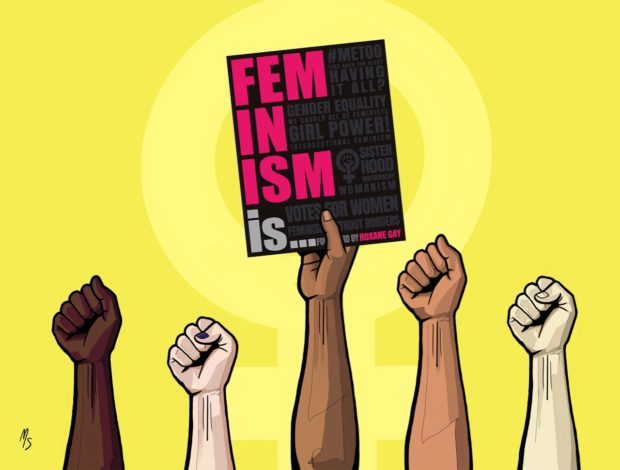
Feminism is . . .
Confession: I am a second-wave feminist. As Maya Angelou pointed out, “I’m a feminist. I’ve been a female for a long time now. It’d be stupid not to be on my own side.”
But if you’re a “I’m not a feminist but … “ or a “We don’t need feminism, we’ve won equal rights” Feminism is . . . (DK Publishing, 2019) invites you to rethink the meaning of the word in the context of where we were, where we are and where we need to be to realize true equality.
Feminism is . . . doesn’t preach. No high-charged, psychobabble here. Using engaging and accessible language, it does explore what equality for women really means and the impact of current inequality – despite legislation – on women at home, at work, in the bedroom and the boardroom.
And it tackles trending topics like sex versus gender, gender stereotypes, intersectionality and the #MeToo Movement. Feminism is . . . believe it or not moments:
- Emmeline Pankhurst – she coined the word suffragette – tired of peacefully fighting for the right to vote got physical; she and her group chained themselves to fences, and set fire to the homes of politicians.
- New Zealand granted women the right to vote in 1893 – yay! – but Italy didn’t get on the bus till 1945 – boo!
- Women in Canada voted for the first time in a federal election in 1921 – unless they were Aboriginal, in which case they had to wait till 1960, or Asian, till the late 1940s.
- Bra burning by the Women’s Liberation Movement in the ‘70s was a big fat exaggeration of a report of a feminist protest at a U.S. beauty contest where women threw their bras into the trash.
- In 2011, a Toronto cop suggested that if women didn’t dress like sluts, they probably wouldn’t get attacked. Oops. In protest of victim blaming and slut shaming women took to the streets in their underwear and SlutWalk was born.
- Until 2017, in India, a man could end his marriage just by saying talaq – divorce – three times to his wife. Surprise – it didn’t work the other way around.
Feminism is . . . is full of you’re-kidding-me moments that remind you, especially in today’s global political climate, how hard-won women’s victories have been but how easily they could disappear.
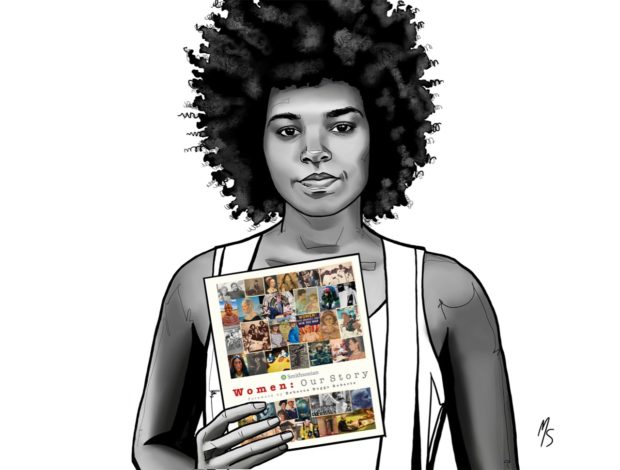
Women: Our Story
The back cover of this totally engaging book asks a provocative question: “Have you ever wondered why history books are full of men? And what women were doing at the time?”
Women: Our Story (DK Publishing, 2019) sets out to offer answers, exploring the roles that women have played, and continue to play, in shaping culture and society.
Published in collaboration with the Smithsonian, Women’s six chapters take us from pre-600ce and the birth of patriarchy to present day, with rich photography and illustrations, In Brief sidebars that put events in historical context, snappy bios that bring the game changers to life, and the kind of quotes you want on cards to send to your BFFs.
Such as:
- “If you allow (women) to achieve equality . . . they will be . . . masters.” Cato the Elder, 234- 149ce, as recorded by Livy, History of Rome
- “In a sick society, women who have difficulty fitting in are not ill.” Charlotte Perkins Gilman, 1892
- “In times of crisis, women eventually are called upon to sort out the mess.” Christine Lagarde, 2014
Women: Our Story gives lie to the notion that women have ever only played bit parts in human history, shining the spotlight on women’s pivotal roles and offering credit where credit is long overdue.
As Rebecca Boggs Roberts writes in her Foreword: “I’m not talking about the power-behind-the-throne model, the acknowledgment that Abigail Adams may have influenced her husband’s revolutionary thinking, or Zelda Fitzgerald inspired F. Scott’s best lines. I’m talking about actual history made by women – in many cases for women.”
You May Also Enjoy Reading…
Charlotte’s Top 5 Must Reads for January
Charlotte’s Top 5 Must Reads for December
Charlotte’s Top 5 Must Reads for November
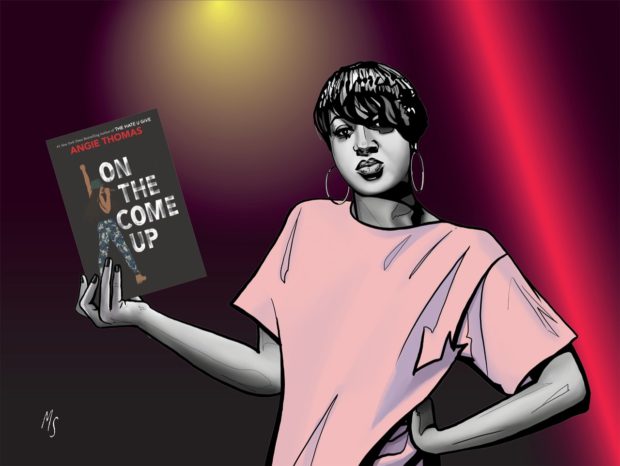
You know how much I loved Angie Thomas’ debut novel The Hate U Give and I wasn’t a voice of one – it was a runaway bestseller, won too many awards to count and was made into a film that earned a Rotten Tomatoes 8.2/10.
Thomas is back at it with On the Come Up, an unflinching and unapologetic story Thomas describes as, “my love letter to those black girls who are often made to feel that they are somehow both too much and not enough”.
Sixteen-year-old Brianna is the daughter of an underground hip-hop legend killed in gang warfare just before he hit big. Bri wants to get to where her dad didn’t: rapper stardom. And she wants to do it on her own terms, using her own voice.
Bri’s talented. Everyone says so. But as her rep grows, she gets labeled a hoodlum, an angry black girl who won’t play by the rules. When Supreme, her dad’s manager, takes notice and signs her, Bri discovers that she’s being played – he amplifies her hoodlum status for airtime, and forces her to record a demo someone else wrote.
No surprise, Bri fights back, and of course, wins. But that’s not really the point of the story. Rather, On the Come Up – the term means on the verge of making some serious noise – is all about fighting for your dreams and how freedom of speech, especially for young black people, isn’t always free.
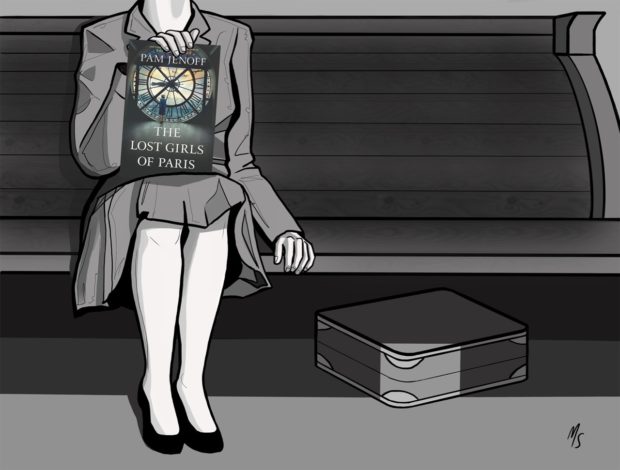
The Lost Girls of Paris
Inspired by true events, best-selling author Pam Jenoff’s latest tells the story of 12 female secret agents, trained in London during World War II and sent to Occupied France to serve as couriers and radio operators in support of the resistance. They never came back – and no one knows, or is willing to tell, what happened to them.
Manhattan 1946. War widow Grace Healy finds an abandoned suitcase tucked under a bench in Grand Central Station. Keen to find the owner, Grace opens the case and discovers a dozen portraits, each of a different woman.
On impulse, she takes the pictures. And so starts a journey of discovery that leads, finally, to the truth about Eleanor Trigg and her “girls”, a dedicated team of fearless operatives and the role they played in helping to win the war.
And to a face-to-face meeting with Marie, the only woman who survived capture, torture, imprisonment – and when a bomb exploded on the freight train transporting her and other prisoners East as the Allies advanced – escaped and disappeared into thin air.
The Lost Girls of Paris honours the remarkable commitment, courage and fierce friendship of the women who stood together to risk – and lose – their lives fighting for freedom.
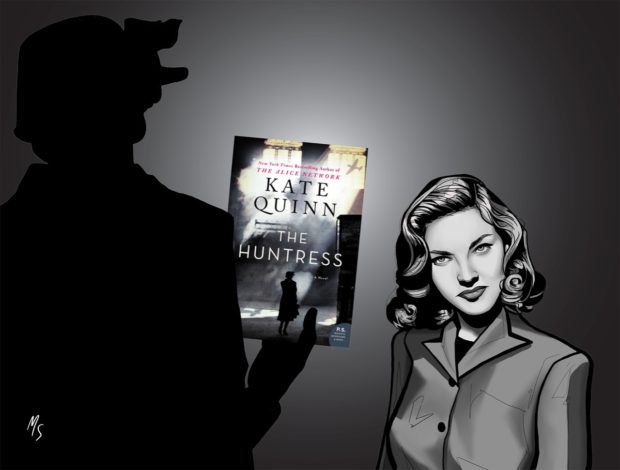
The Huntress
Kate Quinn, whose award-winning The Alice Network was the book of 2017, also celebrates the little-known contributions women made during World War II – on both sides.
The Huntress tells the story of three people in search of answers: Ian Graham, a renowned war correspondent turned Nazi hunter; Nina Markova, one of Stalin’s feared Night Witches, the first band of women to fly bomber runs during the war; and Jordan McBride, a Boston teenager whose new stepmother hides a war chest of secrets.
Ian Graham reported on the horrors of the war, from Omaha Beach to the Nuremberg Trials; when the Nazis surrendered, he closed the lid on his typewriter to chase the criminals. His obsession: The Huntress, mistress of a vicious, high-ranking SS officer, who trapped and murdered refugees, many of them children, by her lakeside retreat in Poland.
Nina Markova, born in the Siberia wilderness and just as wild as the landscape, risks everything to join the Night Witches. When she crash lands behind enemy lines, her fearlessness keeps her moving west until she encounters the Huntress – and narrowly escapes with her life.
Budding photographer Jordan McBride knows her stepmother, a gentle, soft-spoken German émigré, is hiding a sinister past. The three join forces in Boston and the Huntress becomes the hunted.
The Huntress is a page-turning tale of what happens when we search for a truth we may not want to discover.
Written by Charlotte Empey with Illustrations by Mark Scheibmayr
Some of the links in this story use affiliate links. This means that if you make a purchase through our site, dobbernationLOVES will earn a small commission at no extra cost to you. Your support helps us to produce comprehensive content.


